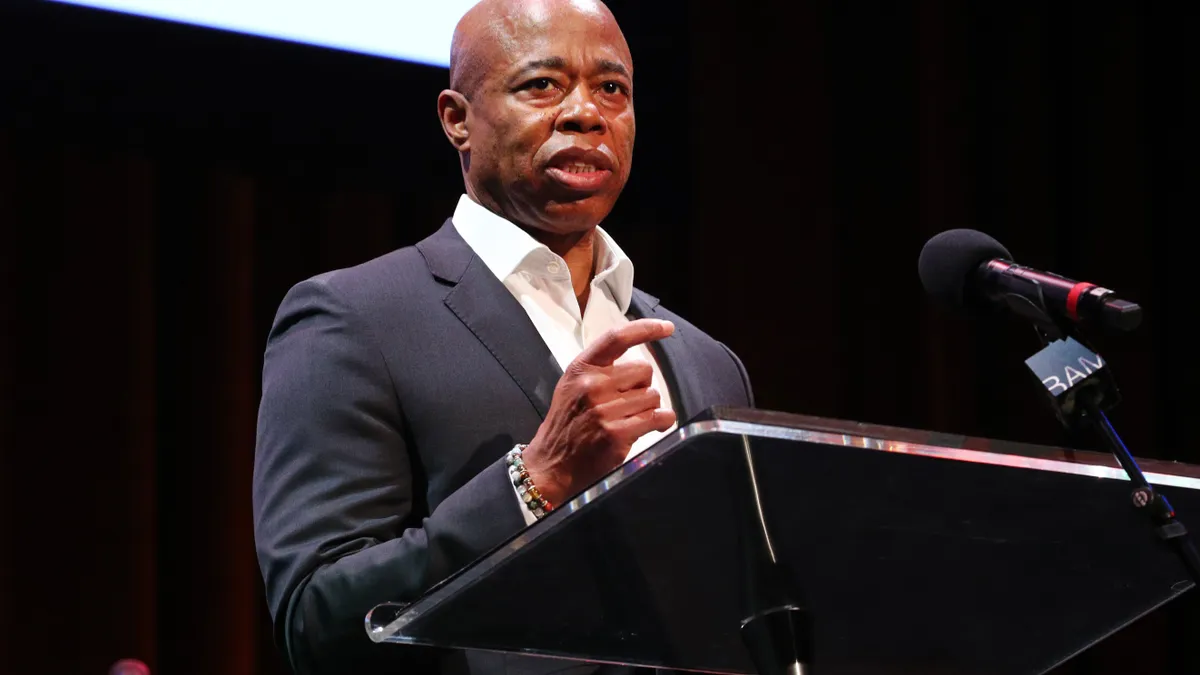Dive Brief:
- New York City announced it is setting the minimum wage for app-based delivery workers at $17.96 on July 12, Mayor Eric Adams announced Sunday. The wage will rise to $19.96 on April 1, 2025.
- The implementation of the wage floor comes three months after the city’s Department of Consumer and Worker Protection cut its proposal for the wage from $23.82 an hour to $19.96 an hour. The reduction was preceded by vocal industry opposition.
- The wage rule leaves wide latitude for delivery apps to calculate wages based on trips, hours worked or other formulas, according to the press release. The lower-than-initially-proposed wage floor and broad discretion for employers to set wages fits into a broader retreat from the aggressive suite of laws to regulate delivery apps that passed in the waning months of Mayor Bill de Blasio’s term.
Dive Insight:
The rule contains separate stipulations for delivery apps that pay workers for the entire time they are connected to the app, including downtime between orders and time spent waiting to pick up orders, and for apps that only pay couriers for time actively spent fulfilling deliveries.
This year, delivery apps that fall in the first category must pay couriers 30 cents per minute, not including tips, while the second aggregator type must pay 50 cents per minute. These rules were calculated based on DCWP estimates that delivery workers spend about 60% of their working hours on trips and about 40% on call.
The rule also mandates adjustments for inflation in the future. By the city’s estimates, the 2025 target wage will represent a raise of almost $13 per hour for delivery workers. However, delivery aggregators can use alternate pay models so long as they yield the targeted hourly wage.
“Today is a historic win for New York City’s delivery workers,” DCWP Commissioner Vilda Vera Mayuga said in a statement. “When the rate takes full effect, workers will make three times as much as they do now.”
Although the wage floor is lower than the city’s first proposal, the new rule has still drawn opposition. DoorDash called the 50-cent-per-minute payment rule extreme.
“Given the broken process that resulted in such an extreme final minimum pay rule, we will continue to explore all paths forward — including litigation,” a DoorDash spokesperson wrote in an email to Restaurant Dive.
Grubhub, in a statement emailed to Restaurant Dive, also expressed dissatisfaction with the rule.
“We are disappointed in the DCWP’s final rule, which will have serious adverse consequences for delivery workers in New York City. Unfortunately, New York City chose not to partner with the industry on a solution that would have benefited all aspects of the gig economy,” Grubhub said.
Uber Eats did not immediately respond to a request for comment.
Recent changes in New York City and State labor law, like the lowering of the proposed wage floor and a modest increase in the state’s minimum wage — which drew praise from McDonald’s U.S. president Joe Erlinger and is lower than the legislature’s initial hourly wage proposal of $21.25 — contrast to aggressive efforts in other blue states to strengthen labor’s hand.
In 2020, for example, California Democrats and labor organizations passed a bill (AB 5) to classify gig workers as independent contractors, and a bill (AB 257) to set up a state fast food standards and wage council with representatives of labor, business and the state in 2022. California’s state assembly also passed a bill (AB 1228) establishing joint-employer status for fast food franchisors and franchisees last month.
AB 5 was repealed in a referendum and is currently subject to an ongoing court battle, while AB 257 faces a referendum in November 2024 and AB 1228 is currently working through the California state senate.
Minnesota also passed a bill to set gig economy wages, though the legislation impacts rideshare drivers, not delivery workers. Governor Tim Walz, however, vetoed the bill following industry threats to cease operations in the state. Though that bill was vetoed, it was part of a broad sweep of legislation passed at the end of that state’s legislative session containing a number of long-held progressive goals.
Correction: A previous version of this article misstated the workers impacted by a bill passed by the Minnesota legislature. That bill applied to rideshare drivers.















